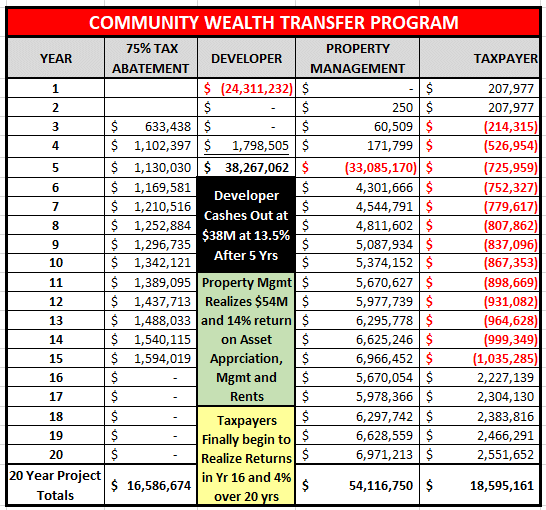Even with the Coronavirus, EDGE wealth transfer programming continues uninterrupted in Memphis. This blog will recap the EDGE meeting on 3/18/2020 that awarded a residential PILOT to the Link Apartment project, locally led by Bob Loeb while reviewing some other residential PILOT awards.
Overall, the blog is mostly about overall programming and less the developer Bob Loeb. One has to give Loeb credit. He asks for PILOTs in person and does not have front men like some others apparently do in Memphis asking for obnoxious 30 year PILOTs.
The conspiratorial virus of no oversight of the public-private complex is alive and well in Memphis. Only Charles Belenky and Joe B. Kent represented the taxpayer in EDGE proceedings with the City Council and County Commission unrepresented. This absence of local officials occurred as incomplete, thereby bogus EDGE staff accounting reared its head again at the meeting and related to the Link Apartment project.
If anyone has questions regarding the calculations in this blog, I welcome the scrutiny. So email me at jkent@pathtrek.net.
EDGE Recap – How Wealth Transfer Works
Wednesday, during public comment, the EDGE Board was publicly challenged with specific details regarding 1) affordable housing on the Loeb represented North Carolina based Grubb Properties Link Apartment project and on 2) the “But For Test” for project financial feasibility to justify the need for a residential PILOT as contained in EDGE residential PILOT program requirements. The question was answered in the EDGE staff led Link Apartment presentation with a return on equity investment of 5.1% with a PILOT and .84% without. But there does not appear to be any continuity in EDGE’s “but for” threshold based on previously approved residential projects.
One characteristic about the Link Apartment application is the contained proforma only provides a cash flow return on equity analysis without a PILOT. This is unique, as all other EDGE residential PILOT applicants submitted proformas with and without a PILOT. Given this, a proforma analysis was reconstructed for the Link Apartment application proforma found on page 10 for cash flow return on equity with a PILOT for the project.
After close analysis of the Link Apartment application and the above reconstructed analysis, here are some facts about the Link Apartment PILOT:
Using the assumptions from the Link Apartment application for proforma reconstruction due to the omission from the application of a proforma with a PILOT, Grubb and Loeb Properties increases cash flows and their cash out price by $10M in year 5 from $24M to $34M while getting an additional $2M for the Broad property land and $2M in developers fees. The increased cash flow is due to the 75% abatement. The former results in an annualized return of 13.5% for the 5 year project. Without including the appreciation for land and developers fees the return on equity with a 75% abatement was 10.5%
The EDGE staff analysis only provided a year 4 “but for” analysis and not an analysis on the entire project showing only a 5.1% return with the 75% abatement. This constitutes incomplete and therefore bogus accounting for the overall project.
The unknown property management company will make a 14.1% annualized return on a $33M investment through increased property value, management fees and rental income over 15 years beginning in year 6 of the 20 year project.
Taxpayers will make 4% on their $17M abatement investment with positive returns not beginning until year 16 of the 20 year project.
Public commenter proposed a 40% abatement to the EDGE Board for the Link Aparment project which would have provided the developer with a 5.9% return on equity and 9.3% return when considering land sale and developer fees. The property management company would have made a 14.8% return. The EDGE Board, robotically stuck on 75% for all, did not take up the taxpayer proposal. Had the 40% abatement proposal been adopted, it would have saved taxpayers $8.2M.
When taking pictures of the EDGE staff “but for” calculations presented in the public meeting, seemingly concerned, Reid Dulberger asked a public audience member to sit down. The reason pictures were being taken is because the “but for” analysis is not contained in published public documentation. And further, taking pictures in public meetings is a typical occurrence as long as proceedings are uninterrupted. The “but for” analysis provided by EDGE statff is incomplete for year 4 only and not for the entire project life which may point to the reason for Dulberger’s concern.
The Link Apartment project was approved by the EDGE Board with barely a quorum of 5 of 9 members present. Al Bright, due to some type of conflict, recused himself from voting. Bright’s conflict related recusals are rather common which is another reason that he should not have been reappointed for what will turn out to be a 16 yr EDGE Chairman appointment. The other 4 members unanimously voted for approving the 15 yr. 75% abatement for the Link Apartment project.
With Shelby County being the only County in the State that offers residential PILOTs where any abatement at all is more than developers would get anywhere else in the State, EDGE does not have established “but for” criteria. Return on equity is all over the board, in their residential PILOTs based on a review of residential PILOT applications. And unfair to EDGE, the Downtown Memphis Commission’s data is effectively unaccessible.
The Thrive @ The Park application reveals an average 13.4% return on equity with a PILOT. Without a PILOT, the proforma shows an average return of 6.65%. That project did not need a 75% abatement or perhaps any abatement at all. But the EDGE Board is stuck on 75% for all. This one PILOT cost taxpayers $6.3M.
The EDGE Board moved to accept any state law that would allow them to meet telephonically. This will have the effect of blunting public participation in public meeting with public comment not read allowed.
In short, its just more incomplete bogus accounting to justify excessive abatement awards fueled by a conspiracy of no governmental oversight and runaway elitism.
How Community Wealth Transfer Works
The key concern that drove this analysis is that the Grubb/Loeb Link Apartment PILOT application did not contain a proforma with a PILOT as did the other residential PILOT applicants.
The analysis in this section pulls together the Link Apartment application, developer proforma along with the EDGE economic project summary while realizing additional tax revenue from construction and operations. The below table shows how community wealth transfers works for residential PILOTs and a 75% tax abatement with values derived from the proforma and application.
The developers’ 13.5% return, in this example, includes return on equity, land sale appreciation and developers fees. The unknown property management company generates their 14.1% return from real estate appreciation, rental income and management fees beginning in year 6 of the 20 year project. And taxpayers generate their measly 4% return through property tax abatements and only begin generating positive returns in year 16 of the 20 year project life. See below community wealth transfer table:
Conclusion
While bogus accounting rears its head again, there is no oversight of the public-private complex in Memphis. And more than ever, with Federal money coming in, its probably never been more important. But it comes amidst a culture of no oversight where legislators really don’t understand the pratice of rigorous taxpayer oversight. The list of examples is exhausting and includes: bogus accounting, unknown total tax incentive amounts, misappropriated funds, elitist giveaways with no contract deliverables and botched taxpayer funded initiatives.
All of that to say, the current Coronavirus could be used to reset the culture. But with EDGE holding telephonic meetings in the future while using bogus accounting in broad day light, who knows what’s next. One thing is for sure. Those tax abatements that have not worked for economic development and only for the small few corporate/real estate interests, are set to continue on the back of a Memphis community in need. And those incentives will be on top of $120M in annually recurring tax incentives going well into the future.
In the end, the conspiracy of no oversight hurts all to include even corporate/real estate interests while being anti-business and economic development.


